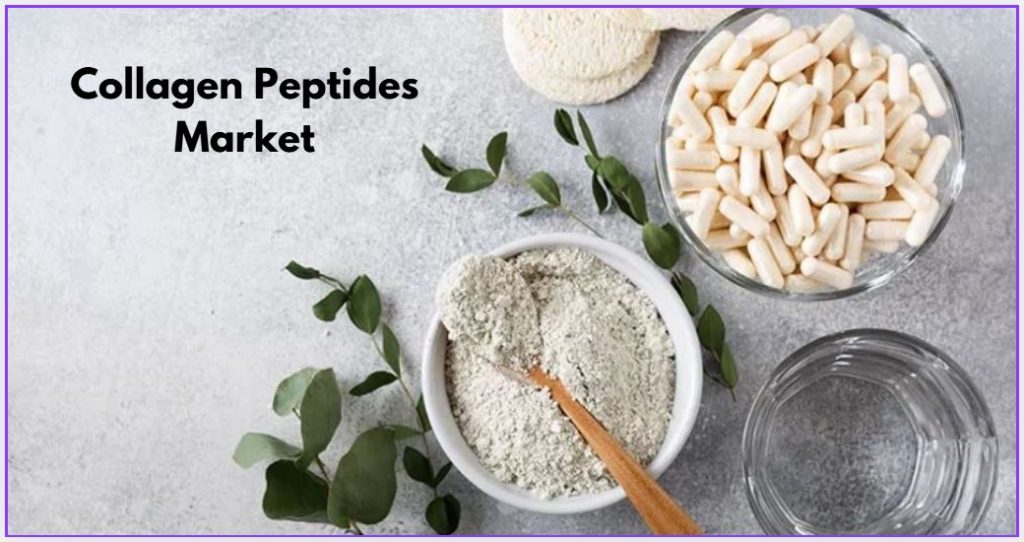
Market Overview
The Collagen Peptides Market is projected to grow from USD 1,155 million in 2024 to USD 2,368.11 million by 2032, registering a compound annual growth rate (CAGR) of 9.39%. This growth reflects the increasing demand for health and wellness products across global industries, including nutrition, personal care, and pharmaceuticals. Collagen peptides, which are highly bioavailable and easily digestible, are gaining traction as consumers become more aware of their health benefits.
Collagen peptides are widely recognized for their role in improving skin elasticity, joint and bone health, and muscle mass. As the global population ages and lifestyle-related disorders become more common, consumers are increasingly looking for preventive solutions that are both effective and convenient. This demand is fueling the adoption of collagen peptide supplements, especially in developed economies with high per capita spending on health and beauty products.
Additionally, the rise in fitness trends, sports nutrition, and the consumption of clean-label food products is boosting the use of collagen peptides in everyday diets. Companies are launching innovative formulations, including ready-to-mix powders, fortified beverages, and functional snacks, to meet this demand. With clean-label trends influencing purchase decisions, marine and bovine-sourced collagen peptides are becoming increasingly popular due to their natural origin and high protein content. The market is also witnessing substantial investment in R&D to expand the application scope of collagen peptides across various sectors, ensuring robust growth in the coming years.
Get full market insights: https://www.credenceresearch.com/report/collagen-peptides-market
Market Drivers
Rising Focus on Preventive Healthcare
The growing prevalence of chronic illnesses and age-related ailments is pushing consumers toward preventive health measures. Collagen peptides are gaining attention for their role in improving joint mobility, skin vitality, and bone density. As awareness increases, the demand for collagen-based dietary supplements and wellness products is witnessing a sharp uptick. Preventive care is becoming a norm, especially among middle-aged and elderly populations in North America, Europe, and parts of Asia.
Expanding Demand in Sports and Fitness Nutrition
The surge in gym-goers, athletes, and active lifestyle enthusiasts has led to a booming market for sports nutrition. Collagen peptides support muscle recovery and reduce the risk of injury, making them an essential ingredient in post-workout supplements. Brands are capitalizing on this trend by offering flavored collagen powders, bars, and ready-to-drink shakes tailored to fitness consumers. The clean-label appeal and protein-rich profile of collagen further amplify its demand in this segment.
Widespread Use in Functional Foods and Beverages
Collagen peptides are being incorporated into a variety of functional food and beverage products. With a neutral taste and high solubility, they blend seamlessly into drinks, snacks, and meal replacements. Food manufacturers are reformulating their product lines to include collagen as a functional ingredient to attract health-conscious consumers. This trend is significantly influencing growth in both the foodservice and retail sectors globally.
Growth in Cosmetic and Personal Care Applications
Beauty-from-within is a prominent trend driving collagen peptide use in personal care products. These peptides enhance skin hydration and elasticity, making them popular in anti-aging formulations. Skincare brands are launching ingestible beauty products targeting youthful skin and wrinkle reduction. The synergistic use of collagen with vitamins and antioxidants in nutricosmetics has unlocked new revenue streams for personal care brands.
Market Challenges
Fluctuations in Raw Material Availability
The supply of raw materials such as bovine, porcine, and marine collagen is often subject to seasonality and livestock health concerns. Disease outbreaks in animals or regulatory bans can disrupt supply chains, impacting production timelines. Such uncertainties create price fluctuations, which can hinder consistent product availability and profitability for manufacturers.
Regulatory and Labeling Complexities
Collagen peptides fall under multiple regulatory frameworks across regions, often leading to inconsistencies in compliance. In some countries, these peptides are categorized as food supplements, while others treat them as functional ingredients or pharmaceuticals. This variation complicates international trade and necessitates region-specific strategies for product formulation and marketing.
High Cost of Quality Production
Producing collagen peptides of high purity and bioavailability requires advanced extraction and hydrolysis techniques. These processes can be expensive, making high-quality collagen products less affordable for price-sensitive markets. Cost barriers also affect small and medium enterprises looking to enter the market.
Consumer Skepticism and Awareness Gaps
Despite growing awareness, some consumers remain skeptical about the efficacy of collagen peptides. The benefits are not always immediately visible, leading to inconsistent usage or discontinuation. Additionally, the scientific jargon surrounding peptide technology can deter lay consumers unless effectively communicated through marketing and education campaigns.
Market Opportunity
Emergence of Marine Collagen Alternatives
With rising vegetarianism and ethical concerns over animal-sourced ingredients, marine collagen is gaining popularity. Derived from fish skin and scales, it offers similar health benefits while appealing to environmentally-conscious consumers. As marine sourcing gains regulatory acceptance, it opens new frontiers for clean-label collagen peptide products in mainstream retail.
Growing Popularity in Emerging Economies
Emerging markets such as India, China, Brazil, and Southeast Asian countries are showing strong demand for collagen peptide-enriched foods and personal care items. Rising disposable incomes, urbanization, and increased exposure to global beauty standards are fueling this trend. Local manufacturers and international players alike are expanding operations in these regions to tap into their potential.
Customization and Personalization Trends
Consumers are increasingly seeking personalized nutrition solutions. Collagen peptides are being formulated into customized sachets, capsules, and beverages based on individual health goals. Brands offering DNA-based or AI-driven nutrition plans are integrating collagen into their platforms, creating a high-margin, consumer-centric growth opportunity.
Collaborations and R&D Expansion
Collaborations between biotech firms, ingredient suppliers, and food manufacturers are on the rise. These alliances aim to enhance product functionality and expand collagen’s application scope. Continuous R&D investments are leading to innovation in peptide delivery formats and absorption technologies, improving product performance and broadening market appeal.
Market Segmentation
By Product Type:
Based on Source
- Bovine
- Porcine
- Marine & Poultry
Based on Application
- Nutritional Products
- Food & Beverages
- Personal Care Products
- Pharmaceuticals
- Other Applications
Based on Form
- Dry
- Liquid
Based on Region
North America
- U.S.
- Canada
- Mexico
Europe
- UK
- France
- Germany
- Italy
- Spain
- Russia
- Belgium
- Netherlands
- Austria
- Sweden
- Poland
- Denmark
- Switzerland
- Rest of Europe
Asia Pacific
- China
- Japan
- South Korea
- India
- Australia
- Thailand
- Indonesia
- Vietnam
- Malaysia
- Philippines
- Taiwan
- Rest of Asia Pacific
Latin America
- Brazil
- Argentina
- Peru
- Chile
- Colombia
- Rest of Latin America
Middle East & Africa
- GCC Countries
- South Africa
- Rest of the Middle East and Africa
Regional Analysis
North America
North America leads the collagen peptides market due to its robust health supplement sector and increasing elderly population. The U.S. accounts for a significant share, driven by the popularity of sports nutrition and functional foods. The availability of advanced healthcare infrastructure and consumer awareness supports continued growth.
Europe
Europe follows closely, with countries like Germany, France, and the UK emphasizing preventive health. Regulatory support for natural and clean-label ingredients fuels the adoption of collagen peptides. Beauty-from-within products are particularly popular across Western Europe, supported by a mature cosmetics industry.
Asia Pacific
Asia Pacific is the fastest-growing region, driven by expanding middle-class populations and heightened health awareness. Japan and South Korea are leading consumers due to their established beauty and wellness cultures. China and India are emerging as key markets, with rising consumer expenditure on health supplements and fortified foods.
Latin America
Latin America is witnessing steady growth as consumers shift toward natural ingredients and dietary supplements. Brazil and Argentina are primary contributors, supported by expanding retail channels and digital marketing efforts. The trend of healthy aging and appearance enhancement is gradually gaining traction.
Middle East & Africa
In the Middle East and Africa, the market is in its early stages but growing. The increasing focus on nutrition, along with rising disposable incomes in Gulf countries, is driving collagen peptide adoption. South Africa is a key player with growing demand in beauty and wellness sectors.
Top Companies
- GELITA AG (Germany)
- Ewald-Gelatine GmbH (Germany)
- Rousselot (A Part of Darling Ingredients Inc.) (Netherlands)
- Nitta Gelatin Inc. (Japan)
- Norland Products Inc. (U.S.)
- Gelnex (Brazil)
- Weishardt (France)
- Tessenderlo Group NV (Belgium)
- Chaitanya Agro Biotech Pvt. Ltd. (India)
- Nippi, Inc. (Japan)
Future Outlook
- Rising global demand for nutricosmetics will propel ingestible collagen growth.
- E-commerce will drive product accessibility, especially in emerging regions.
- Innovation in marine collagen peptides will expand clean-label offerings.
- Asia Pacific will dominate future sales due to booming wellness culture.
- Technological advancements in hydrolysis will improve peptide absorption.
- Collaborations between pharma and cosmetic companies will increase.
- Functional beverages with collagen will attract millennial consumers.
- Personalized nutrition will lead to tailored collagen formulations.
- Expansion of halal and kosher certified products will open new markets.
- Regulatory clarity will ease global trade and product standardization.
Get full market insights: https://www.credenceresearch.com/report/collagen-peptides-market









